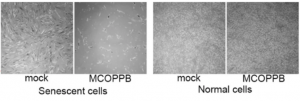Scientists discover promising anti-aging substance
In biology, cellular senescence is the name given to a condition in which cells stop their cell cycle but do not die; they continue to function in the body. Often, cells go into senescence to prevent problems from arising (e.g. in the case of liver damage or wound healing), but in larger numbers and at advanced ages, senescent cells are more likely to create problems.
Scientists from the Epigenetics, Metabolism and Aging team at the International Clinical Research Centre at St. Anne’s University Hospital in Brno (FNUSA-ICRC) have focused their research on new senolytics, popularly known as anti-aging drugs. “Senolytics hold great promise in the fight against age-related diseases,” said Manlio Vinciguerra, head of the Epigenetics, Metabolism and Aging research team. “Over time, senescent cells begin to accumulate in each of us, and as a result of this process, individuals become more susceptible to chronic diseases and experience a decline in cognitive function.”
With the help of senolytics, these senescent cells can be eliminated, thereby contributing to the improvement of chronic diseases that the older generation in particular faces. In their study “Nociceptin/orphanin FQ opioid receptor (NOP) selective ligand MCOPPB links anxiolytic and senolytic effects” for the peer-reviewed journal GeroScience (IF 7.7), the researchers used high-throughput automated screening (HTS) technology to test thousands of molecules, increasing the chance of finding new potential senolytics that could be used as drugs in the future. “We worked closely with colleagues from the Institute of Molecular and Translational Medicine at Palacký University in Olomouc, who identified this new senolytic (MCOPPB) in vitro,” added Manlio Vinciguerra.
MCOPPB (the selective FQ ligand of the opioid receptor nociceptin (NOP) 1-[1-(1-methylcyclooctyl)-4-piperidinyl]-2-[(3R)-3-piperidinyl]-1H-benzimidazole) was selected as the most suitable candidate, which is also being studied as a potential anxiolytic, i.e. a drug that relieves anxiety or psychological tension. However, experiments in the laboratory and in animal models have also revealed a senolytic function for this substance.
Over a period of two months, the test subjects were administered the active substance in several doses. After the experiment, they were subsequently examined. In animal models, the senolytic drugs were shown to delay several age-related disorders, improve physical and cognitive function, and extend lifespan. Despite demonstrating a positive senolytic effect, the drug showed side effects including weight gain. Future drug development will require further studies to clarify the coordination of central and peripheral effects and their impact on metabolism.




